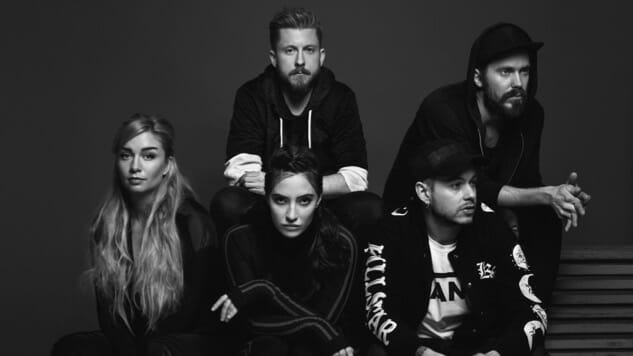Highasakite: Can’t Fight the Feeling

As a musician, Ingrid Helene Håvik takes the stage almost nightly to sing about concepts that seem larger than life, her dense pop songs lingering on the idea of love, loss and survival. But that doesn’t mean that she and her Highasakite bandmates (Trond Bersu, Øystein Skar, Marte Eberson and Kristoffer Lo) buy into the idea of fate.
“I haven’t thought about it, so I don’t believe in that,” says the Norwegian musician from her home in Oslo when the romantic notion is brought up. “And I don’t care. That could be, but it doesn’t have anything to do with me.”
But then again…like most everything else in the Highasakite universe, there’s always a second side to the story.
“I can’t do anything about it,” Håvik continues, further mulling over the idea. “But my mother is a musician. So it has been my upbringing. It’s been a natural choice for me. Some level it feels pre-decided. I didn’t have any other choice. And I’m glad.”
Perhaps Håvik’s resistance to embracing fate with open arms comes part and parcel with a ferocious work ethic. (The band’s Facebook features video of the singer flubbing a vocal take and then immediately asking to go again.) Last May, Highasakite decamped to the studio to record the follow-up to their 2014 international debut, Silent Treatment. After nearly two years of touring, during which Håvik describes the tour van soundtrack as full of “Die Antwoord, Fever Ray, Prodigy, The Knife and Justin Bieber,” they had one goal: write electronic music.
It may seem like a tall order. After all, Highasakite’s output to date has featured strictly organic instrumentation, with Håvik switching off between vocals and percussion. But to hear the singer tell it, their past as students at the Trondheim Jazz Conservatory served them well.
“We are all used to hearing very experimental music,” she notes. “And so we can go quite far before we react to something sounding weird. Absolutely. I think so. Also I think that being used to improvising makes us flexible and work fast and come up with ideas really fast and be creative.”
If Silent Treatment was about fuzzy, childhood-induced nostalgia, Camp Echo is a dark trip into the future—where reality never manages to live up to our dreams. “My name is liar/I’m friends with sin,” Håvik howls against a fractured beat in the fiery opening cut “My Name is Liar.” The album progresses from there, navigating the complex midfields of relationships, heartache and the human mind. But even at its darkest, there’s a strong core of emotion, as Håvik, plays the role of a woman punching above her weight as she struggles to find comfort in her weaknesses.
“It’s a way to express myself,” says Håvik of the songwriting process. “And kind of taking a picture of a feeling, or capturing a moment. This is how I felt or what I thought at this moment. Trying to put it in a jar and not lose it ever.”
-

-

-

-

-

-

-

-

-

-

-

-

-

-

-

-

-

-

-

-

-

-

-

-

-

-

-

-

-

-

-

-

-

-

-

-

-

-

-

-








































